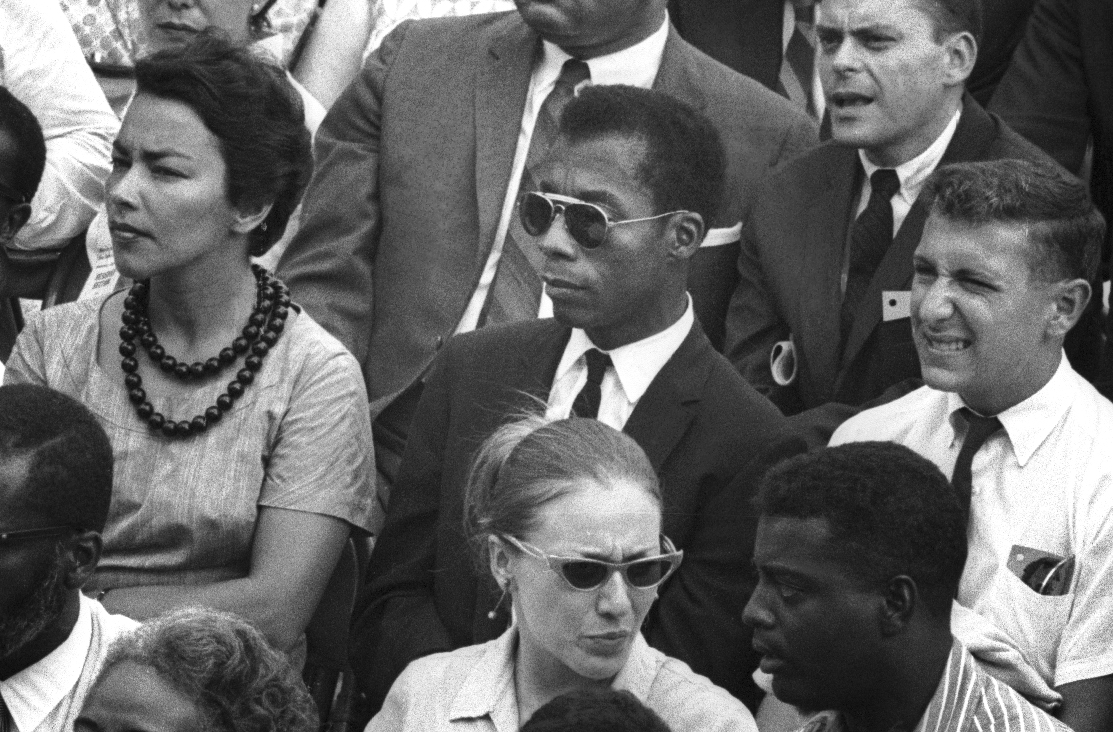![]() Viewers may remember James Baldwin differently, some by his 1953 debut novel, Go Tell It on the Mountain, resonant of his childhood in Harlem during the 1930s, while gay activists champion his 1956 novel, Giovanni’s Room. Others may have an image of the expatriate African American artist living in France or read quotes from his prophetic 1963 essay The Fire Next Time, which warned of rising frustrations in the inner city. But some may not know of James Baldwin at all. I Am Not Your Negro is director Raoul Peck’s decade-long project to assure that his idol, who passed away in 1987, would not be forgotten. Along with reintroducing and reinterpreting Baldwin, the man and artist, for a new generation, he passionately conveys him as acutely relevant, right up to #BlackLivesMatter.
Viewers may remember James Baldwin differently, some by his 1953 debut novel, Go Tell It on the Mountain, resonant of his childhood in Harlem during the 1930s, while gay activists champion his 1956 novel, Giovanni’s Room. Others may have an image of the expatriate African American artist living in France or read quotes from his prophetic 1963 essay The Fire Next Time, which warned of rising frustrations in the inner city. But some may not know of James Baldwin at all. I Am Not Your Negro is director Raoul Peck’s decade-long project to assure that his idol, who passed away in 1987, would not be forgotten. Along with reintroducing and reinterpreting Baldwin, the man and artist, for a new generation, he passionately conveys him as acutely relevant, right up to #BlackLivesMatter.
Peck brings new material to the fore, with private letters and unpublished manuscripts from the Baldwin family archives, read by Samuel L. Jackson. (These writings will be published in a book to be published with the documentary’s broader theatrical release in February 2017.) Insightful and devastatingly eloquent, they are accompanied by rare images, as well as televised interviews and debates scoured from cross-continental archives. The Baldwin family trusted Peck because of his unique oeuvre, which has delved into Africa and the African diaspora, particularly Congolese Prime Minister Patrice Lumumba (a documentary in 1990 and a docudrama in 2000), revolution in Haiti (Moloch Tropical in 2009), and the Rwandan genocide (Sometimes in April from 2005).
Chapter headings, such as “Heroes,” and key quotes marked with dates and locales emphasize autobiographical details—for example, how particular teachers (including poet Countee Cullen) guided Baldwin to look beyond his Harlem neighborhood (and his father’s church) and inspired him to devour books in libraries and start writing. Before he moved to Greenwich Village, he learned about the wider world through Harlem’s movie theaters—specifically, the racial/racist messages Hollywood was communicating in Uncle Tom’s Cabin (1937), John Ford’s The Stagecoach (1939), and Douglas Sirk’s Imitation of Life (1934)—which he brought to his analysis of contemporary films, such as Stanley Kramer’s The Defiant Ones (1958), as an adult. (Peck had a lawyer/expert in fair use of copyright materials counting the allowed seconds for the inclusion here of these recognizable movies.) For example, Baldwin starkly contrasted the social context of the Doris Day vehicle Lover Come Back (1961) to the violence directed toward African Americans occurring at the time.
In the midst of Peck’s years of research, Baldwin’s sister Gloria Karefa-Smart entrusted him with the 30-page, unfinished manuscript Remember This House, Baldwin’s collective and personal biography of three assassinated leaders he knew well: Medgar Evers, Malcolm X, and Martin Luther King, Jr. These leaders in the civil rights movement helped bring Baldwin back to the United States in 1957. He was already uncomfortable in Paris, due to rising anti-Algerian feelings and the francophone negritude movement of African and Caribbean writers, who saw him first and foremost as an American. (Haitian-born/French resident Peck is particularly knowledgeable about that perception of Baldwin.)
Along with the many rare photographs of Baldwin with political leaders, performers, and writers (visiting him in the south of France where he eventually settled, first with his lover Lucien and then with other friends), there are long, mesmerizing clips of his forceful and erudite arguments on historical and contemporary race issues. Peck takes these still-powerful words a step further, superimposing them over images from today’s racial conflicts, including the demonstrations in Ferguson, Missouri. (Screenings at the New York Film Festival were followed at Lincoln Center by a showing for Blackout for Human Rights’ third annual #BlackoutBlackFriday, along with a panel discussion.)
Acclaimed at many film festivals, I Am Not Your Negro is on the short list for eligibility as best documentary at the Academy Awards.







Leave A Comment